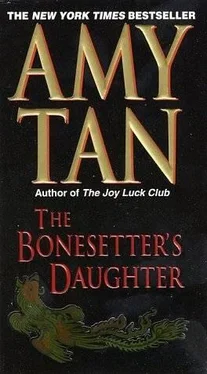"Each resident has an orchid plant. The flower pots are painted with the names they've given their orchids. As you may have already noticed, about ninety percent of our residents are women. And no matter how old they are, many still have a strong maternal instinct. They adore watering their orchids every day. We use a dendrobium orchid known as cuthbertsonii. Blooms nearly year-round, nonstop, and unlike most orchids, it can take daily watering. Many of our residents have named their orchids after their husbands or children or other family members who've already passed. They often talk to their plants, touch and kiss the petals, fuss and worry over them. We give them tiny eyedroppers and a bucket of water we call 'Love Potion.' 'Mother's coming, Mother's coming,' you'll hear them say. It's quite touching to watch them feeding their orchids."
Ruth's eyes welled up. Why was she crying? Stop this, she told herself, you're being stupid and maudlin. He's talking about a business plan, for God's sake, concept-sanctioned forms of happiness. She turned away as if to inspect a row of orchids. When she had collected herself, she said, "They must love it here."
"They do. We've tried to think of everything that a family would think about."
"Or wouldn't," Art said.
"There's a lot to think about," Patel said with a modest smile.
"Do you ever find any of them reluctant to be here, especially in the beginning?"
"Oh, yes indeed. That's expected. They don't want to move out of their old homes, because that's where all the memories are. And they don't want to spend down their kids' inheritance. Nor do they think they're old-certainly not that old, they'll say. I'm sure we'll be saying the same thing when we're their age."
Ruth laughed to be polite. "We may have to trick my mother into coming here."
"Well, you won't be the first family members to do so," Patel said. "The subterfuges people have used to get their parents here-wow, pretty ingenious. It could fill a book."
"Like what?" Ruth asked.
"We have quite a few folks here who don't know it costs anything to live here."
"Really!" Art exclaimed, and gave Ruth a wink.
"Oh, yes. Their sense of economy is strictly Depression-era. Paying rent is money down the drain. They're used to owning a house, paid free and clear."
Ruth nodded. Her mother's building had been paid up last year. They continued along the walkway and went inside and down a hall toward the dining room.
"One of our residents," Patel added, "is a ninety-year-old former sociology professor, still fairly sharp. But he thinks he's here on a fellowship from his alma mater to study the effects of aging. And another woman, a former piano teacher, thinks she's been hired to play music every night after dinner. She's not too bad, actually. We direct-bill most families, so their parents don't even know what the fees are."
"Is that legal?" Ruth asked.
"Perfectly, as long as the families have conservatorship or power of attorney over the finances. Some of them take out loans against the principal on the house, or they've sold their parents' homes and use the money in trust to make the payments. Anyway, I know all about the problems of getting seniors to accept the idea of even considering living in a place like this. But I guarantee you, once your mother has lived here for a month, she '11 never want to leave."
"What do you do," Ruth joked, "spike the food?"
Patel misunderstood. "Actually, because of all the dietary needs of our population, we can't prepare anything too spicy. We do have a nutritionist who makes up the monthly menu. Many of the choices are low-fat, low-cholesterol. We also offer vegan. The residents receive printed-out menus every day." He picked one off a nearby table.
Ruth scanned it. The choice today was turkey meatloaf, tuna casserole, or tofu fajitas, accompanied by salad, rolls, fresh fruit, mango sorbet, and macaroons. Suddenly another problem loomed: No Chinese food.
But when she brought it up, Patel was ready with an answer: "We've encountered that issue in the past. Chinese, Japanese, kosher food, you name it. We have a delivery service from approved restaurants. And since we have two other Chinese residents who get takeout twice a week, your mother can share the selections we get for them. Also, one of our cooks is Chinese. She makes rice porridge on the weekends for breakfast. Several of our non-Chinese residents go for that as well." Patel returned smoothly to his rehearsed patter: "Regardless of special diets, they all love the waiter service, tablecloths at the meals, just like a fine restaurant. And no tipping is necessary or allowed." Ruth nodded. LuLing's idea of a big tip was a dollar.
"It's really a carefree life, which is how it should be when you're this age, don't you agree?" Patel looked at Ruth. He must have picked her as the stumbling block. How could he tell? Did she have a crease in the middle of her brow? It was obvious that Art thought the place was great.
Ruth decided she should get hard-nosed. "Are any of the people here, you know, like my mother? Do any of them have, well, memory problems of some sort?"
"It's safe to assume that half the general population over age eighty-five likely has some memory problems starting to show. And after all, our average age here is eighty-seven."
"I don't mean just memory problems. What if it's something more…"
"You mean like Alzheimer's? Dementia?" Patel motioned them into another large room. "I'll get back to your question in just a minute. This is the main activity hall."
Several people looked up from a bingo game being conducted by a young man. Ruth noticed that most were nicely dressed. One was wearing a powder-blue pantsuit, a pearl necklace and earrings, as if she were going to Easter services. A beak-nosed man in a jaunty beret winked at her. She imagined him at thirty, a brash businessman, confident of his position in the world and with the ladies.
"Bingo!" a woman with almost no chin shouted.
"I haven't called enough numbers yet, Anna," the young man said patiently. "You need at least five to win. We've only done three so far."
"Well, I don't know. Just call me stupid, then."
"No! No! No!" a woman in a shawl yelled. "Don't you dare use that word in here."
"That's right, Loretta," the young man added. "No one here is stupid. Sometimes we get a little confused, that's all."
"Stupid, stupid, stupid," Anna muttered under her breath, as if she was cursing. She gave Loretta the evil eye. "Stupid!"
Patel did not seem perturbed. He quietly led Ruth and Art out of the room and to an elevator. As they ascended, he spoke. "To answer your question, most of the residents are what we call 'frail elderly.' They may have problems seeing or hearing or getting around without a cane or a walker. Some are sharper than you or I, others are easily confused and have signs of dementia due to Alzheimer's or what have you. They tend to be a little forgetful about taking their pills, which is why we dispense all medications. But they always know what day it is, whether it's movie Sunday or herb-picking Monday. And if they don't remember the year, why should they? Some notions of time are irrelevant."
"We might as well tell you now," Art said. "Mrs. Young minks she's coming here because of a radon leak in her home." He presented a copy of the letter he had created.
"That's a new one," Patel conceded with an appreciative chuckle. "I'll keep that in mind for other family members whose parents need a nudge. Ah yes, free rent, courtesy of the California Department of Public Safety. Quite good to make it official, mark of authority, like a summons." He swung open a door. "This is the unit that just became available." They walked into an apartment overlooking the garden: a compact living room, bedroom, and bathroom, empty of furnishings, smelling of fresh paint and new carpets. It occurred to Ruth that what Patel meant by "just became available" was that the last resident had died. The cheeriness of the place now seemed ominous, a façade hiding a darker truth.
Читать дальше












